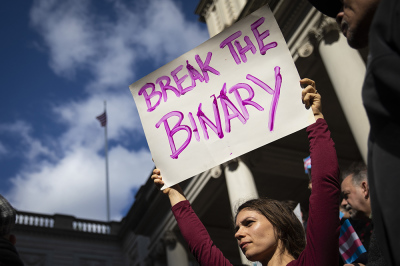5 things every Christian should know about the trans movement

Gender dysphoria afflicting teenage girls, young women
The psychological ailment known as gender identity disorder and later renamed “gender dysphoria," which is defined as persistent psychological distress or incongruence with one's biological sex, was until recently an extremely rare condition that almost entirely afflicted young boys. But a significant shift has occurred in the last decade.
Today, for the first time in approximately 100 years of clinical diagnostic history, the predominant demographic of those suffering from gender dysphoria are teenage girls and young adult women.
Yet the kind of dysphoria these girls and women are experiencing is notably different, and the skyrocketing rates have many believing that it's the result of an internet-fueled peer contagion, what has been called “Rapid Onset Gender Dysphoria” (ROGD).
In the United Kingdom, for example, referrals to the Gender Identity Development Service increased by over 4,000-fold in the past decade, as was documented by the trans-critical website TransgenderTrend.
This medical mystery of ROGD was thoroughly explored in a book released last year titled, Irreversible Damage: The Transgender Craze Seducing Our Daughters by journalist Abigail Shrier. Rapid Onset Gender Dysphoria was the subject of public health researcher Lisa Littman who published a peer-reviewed scholarly article in the academic journal PLoS One in 2018 after she noticed growing numbers of youth identifying as the opposite sex.
Littman’s research revealed that 65% of young girls who had self-identified as transgender during their adolescence did so after spending considerable time on social media. She thus posited that the sharp rise in transgender-identifying girls was not organic but a sudden social contagion.
Soon after publication, trans activists claimed her study employed faulty research methods, and PLoS One's editor-in-chief wound up apologizing for publishing the article, in an unprecedented move. In March 2019, the academic journal published a "correction" for Littman's original article, even though her findings were unchanged.
Earlier this year, mothers involved in a secret online group who managed to connect because their young sons are mired in this peer contagion told CP that teenage boys are also suffering, even as the social dynamics and contributing factors vary from what girls endure.
Send news tips to: brandon.showalter@christianpost.com Listen to Brandon Showalter's Life in the Kingdom podcast at The Christian Post and edifi app Follow Brandon Showalter on Facebook: BrandonMarkShowalter Follow on Twitter: @BrandonMShow




























